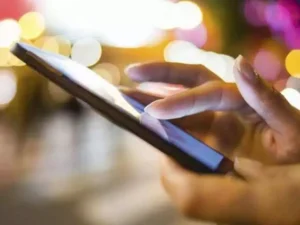In today’s digital age, smartphones have become an indispensable part of our lives. From staying connected to accessing information, these devices offer unparalleled convenience. However, this convenience often comes at a cost, especially in the workplace. Phone addiction, characterized by compulsive device usage, not only diminishes productivity but also hampers interpersonal relationships and mental well-being. In this blog, we delve into the detrimental effects of phone addiction at work and explore effective strategies to break free from its grip.
Contents
How Many Hours On Phone Is Addiction?
 There isn’t a specific number of hours on the phone that definitively indicates addiction, as phone usage can vary greatly depending on individual circumstances and preferences. However, excessive phone usage that interferes with daily responsibilities, relationships, and overall well-being may be indicative of addiction or problematic behavior.
There isn’t a specific number of hours on the phone that definitively indicates addiction, as phone usage can vary greatly depending on individual circumstances and preferences. However, excessive phone usage that interferes with daily responsibilities, relationships, and overall well-being may be indicative of addiction or problematic behavior.
Some experts suggest that spending more than two to three hours per day on non-work-related smartphone activities could be a potential sign of problematic usage. However, it’s essential to consider the context and impact of phone usage on various aspects of life.
Ultimately, if you’re concerned about your phone usage or its impact on your life, it may be helpful to seek support from a mental health professional. Also, you can consider self-assessment tools designed to evaluate problematic smartphone usage.
How Does Phone Addiction Work?
Phone addiction, also known as smartphone addiction or nomophobia (fear of being without a mobile phone), operates on various psychological and physiological levels. Here’s how it typically works:
- Instant Gratification: Smartphones offer instant access to a vast array of information, entertainment, and social connections. This instant gratification triggers the brain’s reward system, releasing neurotransmitters like dopamine. This creates a sense of pleasure and reinforces the behavior of checking the phone repeatedly.
- Intermittent Reinforcement: Phone addiction is reinforced through intermittent reinforcement, similar to gambling or slot machines. Notifications, messages, likes, and updates are unpredictable rewards that keep users engaged and coming back for more. Even if the content itself is not always rewarding.
- Fear of Missing Out (FOMO): Social media platforms and constant connectivity exacerbate the fear of missing out on important events, news, or social interactions. This fear drives individuals to compulsively check their phones to stay updated.
- Escape and Coping Mechanism: For some individuals, smartphones serve as a means of escape from boredom, stress, or uncomfortable social situations. Engaging with the phone provides a distraction and temporary relief from negative emotions.
- Social Validation: Likes, comments, and followers on social media platforms contribute to a sense of social validation and self-worth for many individuals. The desire for validation prompts frequent checking of notifications and updates, as each interaction provides a boost to one’s self-esteem.
- Habit Formation: Repetitive behaviors associated with smartphone use, such as scrolling through social media feeds or compulsively checking email, become ingrained habits through associative learning. These habits are reinforced by environmental cues and triggers, further solidifying the cycle of phone addiction.
Overall, phone addiction is a complex interplay of psychological, social, and neurological factors. Recognizing these underlying mechanisms is crucial for developing effective strategies to manage and overcome phone addiction.
What Are The Negative Impacts Of Phone Addiction At Work?
 Phone addiction at work can have significant negative impacts on both individuals and organizations.
Phone addiction at work can have significant negative impacts on both individuals and organizations.
Consequences
Here are some of the key consequences:
Decreased Productivity
Constantly checking phones for notifications, messages, or social media updates interrupts workflow and diminishes focus. And, leading to decreased productivity and efficiency. Employees may spend excessive time on non-work-related activities, resulting in missed deadlines and incomplete tasks.
Impaired Concentration and Decision-Making
Phone addiction fragments attention and impairs cognitive functions. And, making it difficult for individuals to concentrate on complex tasks or make informed decisions. This can hinder problem-solving abilities and quality of work output.
Increased Stress and Anxiety
The pressure to stay connected and responsive to work-related communication, coupled with the distractions of personal notifications, contributes to heightened stress and anxiety levels among phone-addicted employees. Persistent feelings of overwhelm and burnout can negatively impact mental well-being and job satisfaction.
Strained Interpersonal Relationships
Excessive phone use at work can strain interpersonal relationships with colleagues and supervisors. Constantly checking phones during meetings or conversations signals disinterest and lack of respect, eroding trust and camaraderie within the team.
Negative Perception by Employers
Employers may view excessive phone use as a sign of disengagement or lack of professionalism, potentially damaging an employee’s reputation and career prospects. Persistent phone addiction may result in disciplinary actions or even termination in severe cases.
Physical Health Issues
Prolonged use of smartphones, particularly in poor ergonomic postures, can contribute to physical health problems such as eye strain, neck and back pain, and repetitive strain injuries. Sedentary behavior associated with prolonged phone use may also increase the risk of obesity and related health conditions.
Impact on Work-Life Balance
Phone addiction blurs the boundaries between work and personal life, leading to an imbalance where employees feel compelled to be constantly available and responsive, even during non-work hours. This erodes valuable leisure time and contributes to feelings of burnout and dissatisfaction.
Data Security Risks
Inattentive phone use at work can increase the risk of data breaches and security incidents, especially if employees access sensitive information or corporate networks on personal devices. Accidental sharing of confidential information or falling victim to phishing attacks are potential consequences of distracted phone usage.
Overall, phone addiction at work poses multifaceted challenges that undermine individual well-being, teamwork, and organizational effectiveness. Addressing these negative impacts requires a proactive approach that promotes mindfulness, boundary-setting, and healthy technology habits in the workplace.
How To Make Your Phone Less Addictive?
 Making your phone less addictive involves implementing strategies to regain control over your device usage and establish healthier habits. Here are some practical tips:
Making your phone less addictive involves implementing strategies to regain control over your device usage and establish healthier habits. Here are some practical tips:
- Set Usage Limits
Use built-in features or third-party apps to set limits on screen time and app usage. Set specific periods for work-related activities and leisure, and stick to these boundaries to prevent mindless scrolling.
- Disable Notifications
Minimize distractions by selectively disabling non-essential notifications for social media, games, and other time-consuming apps. Prioritize notifications from essential work-related apps and contacts to stay focused during work hours.
- Create Tech-Free Zones and Times
Designate certain areas of your home or workplace as tech-free zones, such as the dining table or bedroom, to promote mindful interactions and relaxation. Establish tech-free times, such as during meals or before bedtime, to foster meaningful connections and improve sleep quality.
- Practice Mindful Phone Usage
Before unlocking your phone, pause and ask yourself whether the action serves a purpose or is just a habit. Practice mindful breathing or grounding techniques to regain awareness and control over impulsive phone use.
- Utilize Do Not Disturb Mode
Take advantage of Do Not Disturb mode during focused work sessions, meetings, or leisure activities to minimize interruptions and maintain concentration. Customize settings to allow important calls or messages from select contacts while blocking non-urgent notifications.
- Organize and Declutter Apps
Streamline your home screen by organizing apps into folders or categories based on usage frequency or relevance. Remove or archive apps that no longer serve the purpose of reducing visual clutter and temptation.
- Set Boundaries with Work Communication
Establish clear boundaries with work-related communication outside of office hours. Use email filters or auto-responses to manage expectations and prioritize urgent matters, while respectfully declining non-urgent requests during personal time.
- Engage in Offline Activities
Rediscover offline hobbies and activities that bring joy and fulfillment, such as reading, exercising, or spending time outdoors. Allocate dedicated time each day for these pursuits to balance screen time with meaningful experiences.
- Seek Accountability and Support
Share your goals to reduce phone addiction with friends, family, or colleagues who can offer encouragement and accountability. Consider joining support groups or online communities focused on digital detox and mindfulness practices.
- Reflect and Adjust
Regularly evaluate your phone usage patterns and assess their alignment with your values and goals. Identify triggers and habits that contribute to excessive phone use, and adjust your strategies accordingly to foster a healthier relationship with technology.
By implementing these strategies consistently and mindfully, you can gradually reduce phone addiction and reclaim control over your digital habits. Ultimately, leading to improved well-being and productivity.
Conclusion
In conclusion, breaking free from phone addiction at work is vital for fostering productivity, well-being, and healthy relationships. By recognizing the negative impacts of excessive phone usage, and implementing practical strategies like setting usage limits, practicing mindfulness, and prioritizing offline activities, individuals can regain control over their digital habits and create a more balanced approach to technology.
Employers also play a crucial role in promoting a phone-light workplace culture through supportive policies and practices that prioritize employee well-being and focus. With mindful awareness and concerted efforts, it’s possible to overcome phone addiction and cultivate a more fulfilling and productive work environment for everyone.
